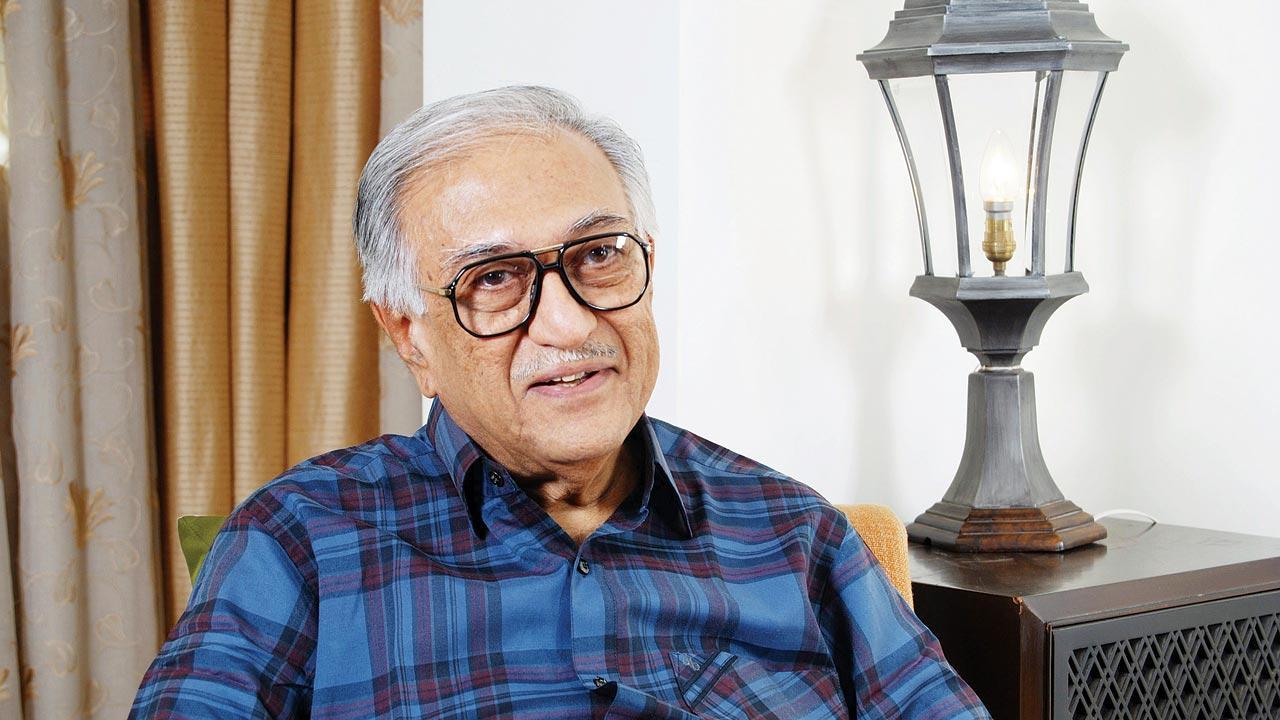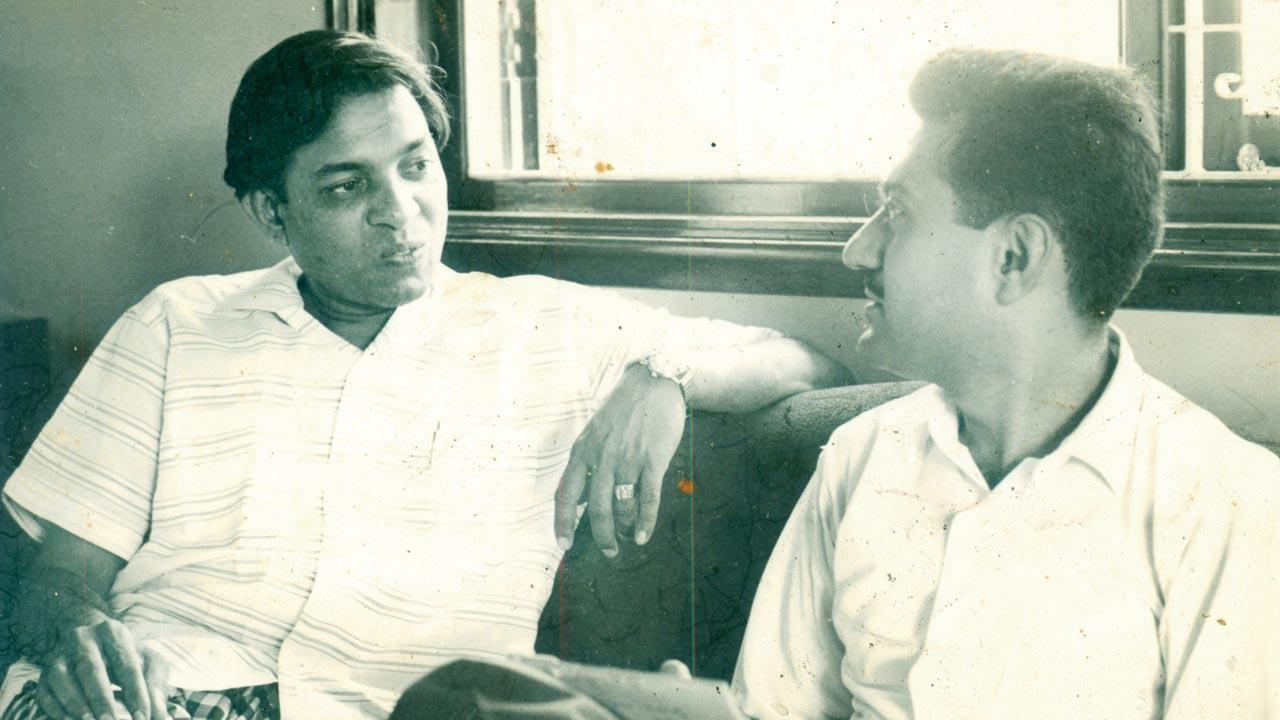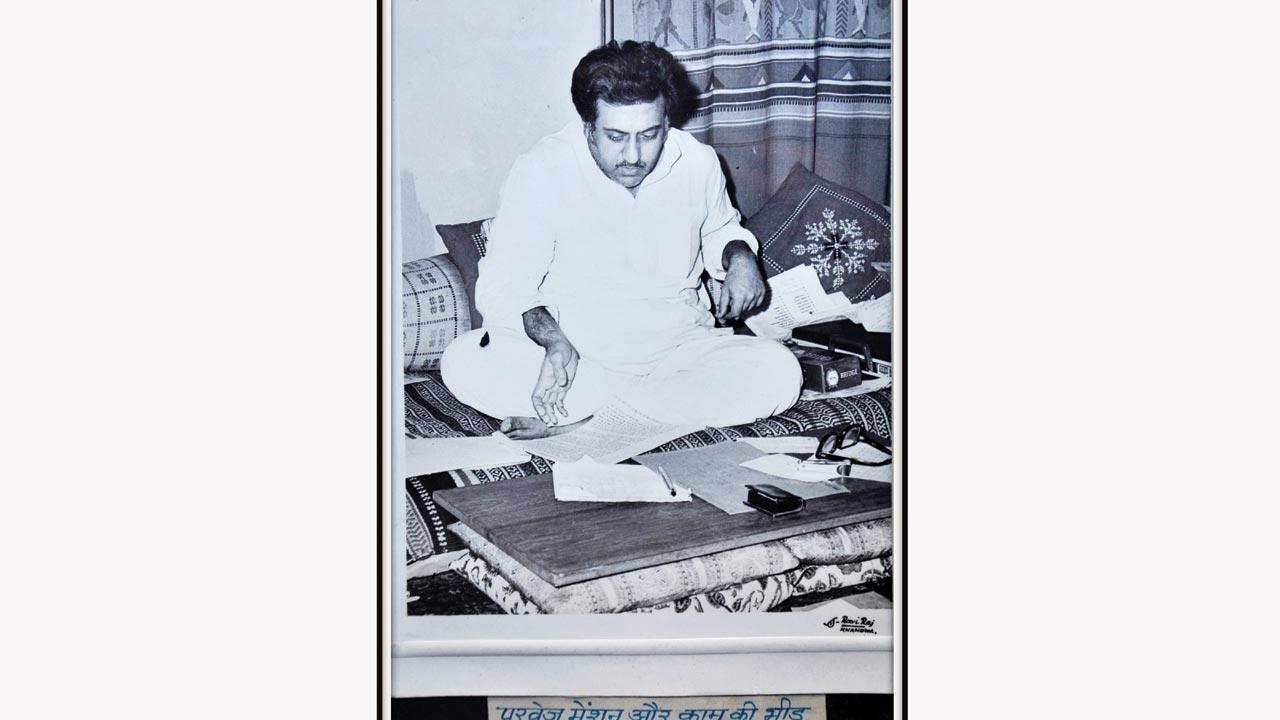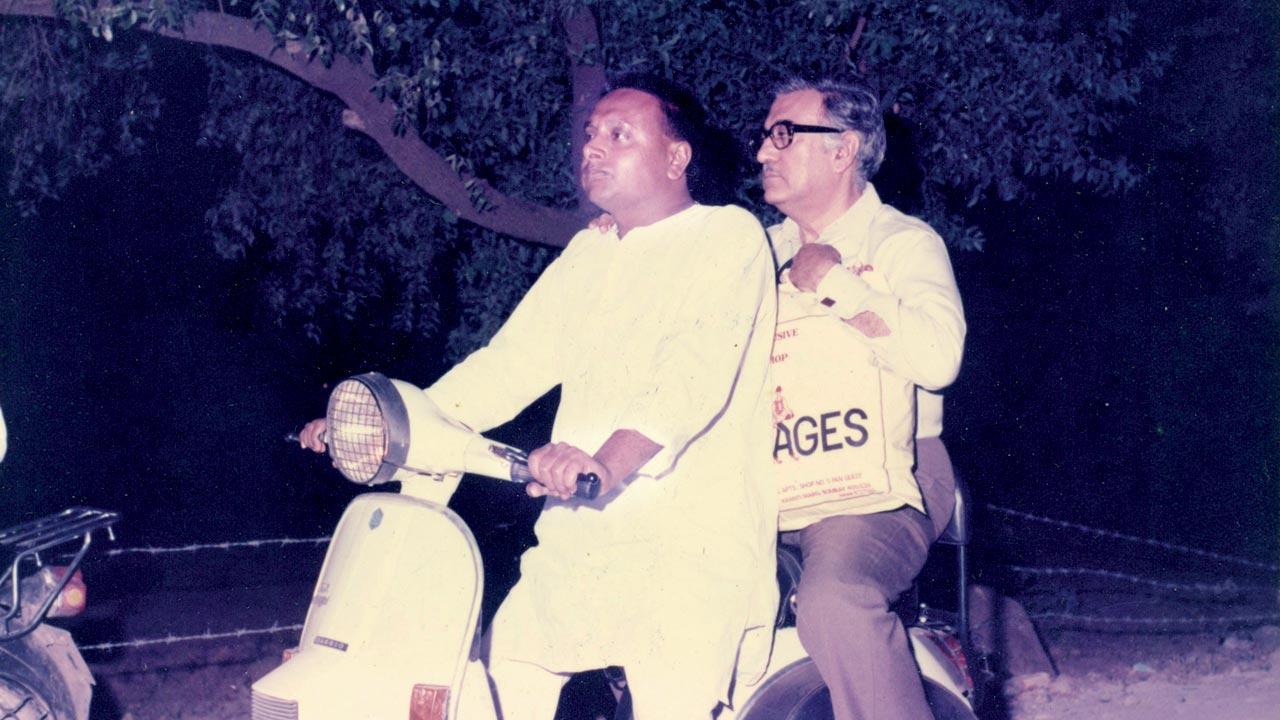On Binaca Geetmala's 70th anniversary, Ameen Sayani talks about its popularity: "Somebody heard it in Germany"
8:39 AM
Posted by Fenil Seta

December 3 will be the 70th anniversary of the most beloved radio entertainment show. Happy birthday Binaca Geetmala!
Meher Marfatia (MID-DAY; November 20, 2022)
Beheno aur bhaiyo, this is a fortnight so worth the song and dance about. It marks the 70th year of a show-of-shows appearing on the airwaves, which wiped Indians cleanly off the streets. Into their homes they disappeared, huddling round the radio for the ultimate programme of popularity-based Hindi film songs. Hosted, of course, by the genial Ameen Sayani, who ruled the broadcast universe with uncommon passion and perception.
The orange flicker from my parents’ Bush set blazed bright at 8 pm midweek, warmed by the pitch-perfect inflection: “Main aapka dost Ameen Sayani bol raha hoon aur aap sun rahe hain Binaca Geetmala.”
Twenty years before Doordarshan’s screening of the Sunday evening movie brought the country to a complete standstill, Wednesdays (8-9 pm) became Geetmala Day, celebrating one of the longest running programmes in broadcast history.
The sweeping cultural phenomenon was introduced on December 3, 1952, by Radio Ceylon, Asia’s oldest station. The British left Ceylon short-wave transmitters belonging to Louis Mountbatten’s South East Asia Command. Colombo used them for commercial radio offerings in Sinhalese, English, Tamil and Hindi.
Wowing an estimated weekly listenership of 21 crores by the end of the 1970s, Sayani emerged the most idolized compere any channel could boast. He interviewed music personalities in other shows. Saridon Ke Saathi, in 1970, Vividh Bharati’s first sponsored programme, was produced and presented by him on All India Radio (AIR).
Geetmala got going in 1952 as Binaca Hit Parade on Radio Ceylon, hosted by Ameen’s brother Hamid Sayani and Happy-Go-Lucky Greg (Greg Rostowski) for the Commercial Service of Radio Ceylon. It shot to prominence as AIR slid on account of I&B Minister B V Keskar’s 1952 ban on film songs. Keskar dourly deemed that tunes like Tadbeer se bigdi hui taqdeer bana le, infusing S D Burman’s buoyant guitar riffs for Baazi in 1951, were over-orchestrated with Western instruments. Radio Advertising Services was opportunely established, with Hamid heading its production wing.
In his Churchgate home, over chai and chivda, Ameen Sayani explains, “Audiences flooded the station with requests for a similar Hindi film songs countdown. The client, Ciba Geigy, landed at the Radio Advertising Services office where I worked, looking for someone to write the script, narrate it, announce selected songs, go through listeners’ letters—for only Rs 25 per programme. Raising my hand I said, ‘I’ll do it.’”
“After the inaugural broadcast, I prayed to God, Gandhi ji and my mother, for 200-300 letters from listeners. We got 7,000. St Xavier’s College friends helped sort them. Doubling each week, within the year mail spiralled to 65,000 a week.”
Listeners arranged their individually preferred sequence of seven songs played in random order. A prize amount of Rs. 100 was split among seven of them. When the award system discontinued after a year, the show stayed a hit parade.
Small subterfuges abounded. Multiple entries were supposedly dispatched from different addresses on the envelope. A telltale post office chhappa revealed the same place—Kalbadevi, for instance.
The obsession from India knit millions internationally. At its peak, Geetmala attracted fans and followers in Ceylon, Pakistan, Bangladesh, Nepal, Afghanistan, UAE, Oman, the West Indies, Africa and then America. “Somebody heard it in Germany, so Europe seemed covered as well. Nothing must have blocked the shortwave reach. The signal probably went into China, which was countering Ceylon getting powerful.”
Rapturous responses poured in, filling stacks of sacks. Sayani generally refrained from accepting gifts. “What can you do, sometimes it’s just love,” his son Rajil says. When a woman sent a shawl as a token of appreciation, he politely conveyed—“Thank you for the present but this would upset my wife.” The lady wrote back, “Ameen bete, I’m of age enough to be your mother. Please accept the gift.”
Older women to schoolboys were in starry-eyed thrall. Byculla resident Rustom Jasoomoney remembers, “In 1955-56 pre-transistor days, at Scout camp in Matheran forest, we abandoned campfire activities on Wednesdays. Trekking two miles by lantern light, with staffs and in uniform, to Sayaji Park in the town centre, where Geetmala was on a public address system. We crossed fingers that failing electricity wouldn’t cut short the show.”
Another excited kid rushed to the radio minutes ahead, little dreaming he would grow up to market the same show. Former Ciba-Geigy advertising manager Homi Randeria says, “Suvi Godambe sifted through the post that record dealers sent and the tabulation went to Ameen. His charm alone made Geetmala shine, even with parallel film music programmes in the early 1980s. We polled listeners, asking if the show should continue amid competitors. The reaction was fantastic. I was shocked, being forced to wait five days before getting into my cabin. It was piled that high with mail begging us to never stop. Till today, I cherish Ameen’s signed cassettes and can’t nap in the afternoon without hearing those retro recordings on my Carvaan radio.”
Manohar Mahajan, Radio Ceylon’s iconic announcer, acknowledges, “He is my guru, my bhagwan, my everything. Unbelievable how, as a child, I was mesmerised by Geetmala tracks from a hotel near my home in Jabalpur, and that legendary voice soon advised, ‘Bombay aa jao.’ To be mentored by the finest industry veteran is a blessing.”
Sayani reminisces, “The beautiful quality of melodies resulted in Geetmala songs becoming an absolute craze. As younger talents, Laxmikant-Pyarelal, Kalyanji-Anandji, Shankar-Jaikishan and R D Burman, gained fame, senior music directors complained the ratings procedure was faulty.”
The basis of the listing initially was sales figures obtained from records stores and, later, numerous listeners’ clubs. To dissolve further rancour, rather than be ranked, songs simply played for a brief year.
Here are Sayani’s own favourites, not necessarily Geetmala inclusions:
Man re tu kaahe na dheer dhare (Chitralekha)
Piya tose naina laage re (Guide)
Bhooli hui yaadon (Sanjog)
Raaton ko chori chori (Mohabbat Zindagi Hai)
Poochho na kaise maine rain bitai (Meri Soorat Teri Aankhen)
Tere bachpan ko jawaani ki dua deti hoon (Mujhe Jeene Do)
Jaane jaan dhoondta phir raha (Jawani Diwani)
Main paagal mera manvaa paagal (Aashiyana)
Rasik balmaa dil kyon lagaaya (Chori Chori)
Jeevan dor tumhi sang baandhi (Sati Savitri).
Mass adulation meant restaurants and paan stalls packed with fevered patrons at that magic hour. “Without a radio in their struggler years, Laxmikant-Pyarelal hung around a cafe—they couldn’t afford entering—peeping in from its window to hear chartbusters blaring out,” Sayani recollects.
“My relationship with playback singers was excellent, especially Lata, Asha, Mohammed Rafi, Mahendra Kapoor and above all Kishore Kumar. Among music directors, I bonded with Naushad, C Ramchandra, Madan Mohan, S D Burman, R D Burman and Roshan, who was a dear friend. I also interviewed these wonderful sangeetkars. The lyricists closest to me were Sahir Ludhianvi and Shakeel Badayuni.”
Rajil adds, “Shakeel Badayuni wrote the sehra verse that was read out when Dad got married [to Rama Mattu, a veritable music encyclopaedia relied upon for information related to any Hindi film song under the sun].”
Geetmala moved from Radio Ceylon to Vividh Bharati, radio to stage, to LPs and cassettes, to TV, CDs, live streaming and finally, to the film music player Carvaan, containing Saregama’s hit Geetmala Ki Chhaon Mein series, paying tribute to less heard, yet deserving, songs.
With Chhoo lene do naazuk hotho ko, in the film Kaajal, the Sartaj Song (crowned song) strategy gracefully retired a number already aired 25 times. The marks scored decided whether it was to be included and ranked in the annual programme.
An admirer of Casey Kasem, producer-presenter of the American Top 40, Sayani reveals that Kasem’s signature line—“Keep your feet on the ground and keep reaching for the stars”—particularly appeals to him.
In 2000, the Advertising Club honoured Binaca Geetmala with the Golden Abby for Outstanding Radio Campaign of the 20th Century. “Entrenched in the hearts and minds of the nation, I still receive about 20 letters a month describing how Geetmala has influenced people’s lives,” says Sayani. “The interaction between me and my listeners has always been very personalised. I was their Ameen Bhai, they my sweet beheno aur bhaiyo.”
Geetmala milestones
December 3, 1952: First Binaca Geetmala broadcast, as a half-hour show
December 3, 1953: First annual programme of 12 top songs
January 5, 1954: Becomes a one-hour-long hit parade with 16 songs
From 1957: Annual programmes start on the last two Wednesdays of every year
March 23, 1966: Introduction of the Sartaj Song concept
January 8, 15 & 22, 1978: Silver jubilee broadcast in three parts from 11 AM-12 noon
August 12, 1981: Entry of the first non-filmi song, Disco deewaane, aha
May 21, 1986: Name change from Binaca Geetmala to Cibaca Geetmala
October 27, 1988: Slot change from Wednesday 8-9 PM to Thursday 9-10 PM
April 6, 1989: Number of songs becomes 14 from 16
November 6, 1989: Starts on 24 Vividh Bharati stations; broadcast day change again to Monday 9 PM
March 21, 1994: Last regular programme of Cibaca Geetmala broadcast. On March 28 and April 4, Sayani features two specials with previous years’ top songs
April 4, 1994: Last broadcast of Cibaca Geetmala
February 18, 2001: First broadcast of Colgate-Cibaca Geetmala
August 24, 2003: Last broadcast of Colgate-Cibaca Geetmala

With singer Manna Dey and music director Ravi

Preparing for the Geetmala silver jubilee stage show in December 1978

With his ardent fan Srinivas Agarwal in Khandwa, Madhya Pradesh, in 1993; Agarwal wrote him a birthday tribute every year
This entry was posted on October 4, 2009 at 12:14 pm, and is filed under
All India Radio,
Ameen Sayani,
Binaca Geetmala,
Bollywood News,
Laxmikant-Pyarelal,
Radio Ceylon,
Rajil Sayani
. Follow any responses to this post through RSS. You can leave a response, or trackback from your own site.
Subscribe to:
Post Comments (Atom)
Post a Comment